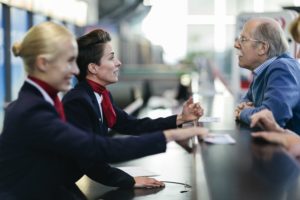
Many aspects of life will likely never return to normal after COVID-19, but here’s how flying will be changed forever because of the coronavirus pandemic.
If the novel coronavirus pandemic has taught us anything, it’s probably that we don’t wash our hands enough and we touch way too much stuff—including our face. While much of everyday life will be changed forever because of COVID-19, here’s a look at how airplanes, the airline industry, and the act of flying to reach a destination may be irrevocably different.
1. Social distancing in the sky
2. Proving your (good) health before flying
3. No more magazines
4. No more carry on bags
5. Masked fliers
6. More fees to fly
7. A new fear of flying
8. Travel insurance
9. Don’t call it a comeback of travel agents
10. The future of flying is flexibility
11. Price changes
12. Cleanliness
13. Flying backward and plastic shields
I – Word Understanding
Pandemic vs Epidemic:
Epidemic – a disease that affects many people in a community or region
Pandemic – an epidemic that has spread across countries or continents
Irrevocably – cannot be changed, reversed or recovered
II – Have Your Say
Share your thoughts on the following possible future of flying:
1. Blocking middle seats or limiting the number of people in premium cabins; more space between passengers in line at check-in, at security, and to board planes.
2. Some kind of testing—contactless heart rate monitoring or a quick temperature check—will be required before boarding a plane.
3. Magazines and other print reading material are no longer being made available.
4. Large carry-on suitcases may not be permitted onboard planes.
5. Flight attendants will likely continue to wear masks and gloves; passengers are required to wear masks.
6. It is expected that the airline industry as a whole will, “ramp up additional fees to get back to profitability.”
7. After this coronavirus pandemic, getting sick while flying may overtake heavy turbulence and a plane crash as the primary fear travelers have while onboard.
8. The future of air travel likely means a surge in passengers saying “yes” to travel insurance to further safeguard against a COVID-19 second wave or another, completely new pandemic.
9. A trusted travel agent, a professional with years of booking experience and armed with detailed knowledge of future restrictions, lingering travel bans, and cancellation policies for hotel properties, cruises, and of course flights, may become in-demand again.
10. Airlines may continue to offer increased flexibility with fares. While likely only temporary, airlines should, “adopt more lenient change and cancellation policies,” at least until demand makes a comeback.
11. Dollar Flight Club’s research indicates a 35 percent drop in fares through 2021 but long term, there will be a 27 percent increase, on average, in the cost to fly from then until 2025.
12. Expect to learn to be more patient for a comprehensive wipe down of every surface on every plane in a post-coronavirus world.
13. Germ-blocking physical barriers between fliers is being considered.


